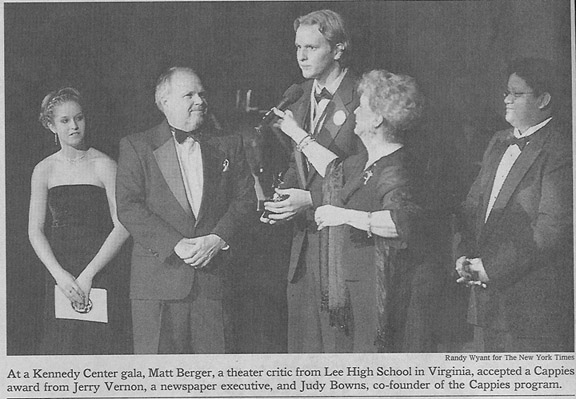
Home
Join Now
Email
Us
Links
Telling
Tales
Photo
Albums
Lancer
Memorial
Alumni
Directory
50's
60-63
64-65
66-68
69
70-72
73
74-76
77-79
80
81-82
83-84
85-89
90
91-93
94-99
2000-13
|
Lee Drama
Senior takes the Gold
Theater Students Get Their Share of the Limelight
By THE NEW YORK TIMES
WASHINGTON, June 22 — The packed concert hall at the Kennedy Center
showcased tuxedos and evening gowns, slow ballads and fast-paced chorus
lines, standing ovations and stomping feet. It was another night of
glittering theater awards, punctuated with delighted gasps and heartfelt
thank yous with all the reticence of the Tony Awards. But these winners were
all students at local high schools, not Broadway stars.
The students clutching their "Cappies" awards were the most prominent
feature of the Critics and Awards Program, founded three years ago in
Northern Virginia to bring theater students the same recognition that
accomplished high school athletes have long taken for granted.
The original program of 23 high schools has grown to include 38 schools in
Virginia and the District of Columbia, and the idea has spread to Dallas, El
Paso, Las Vegas, Cincinnati and Eugene, Ore.
The inspiration grew from frustrations and the pall that fell over many
schools after the 1999 shootings at Columbine High School in Colorado.
After Columbine, it became particularly important to find ways to give
teenagers positive reinforcement, said William Strauss, the author of
several sociology books. But, he added, "You have to balance out the youth
culture."
"This is the real youth culture," said Mr. Strauss, a founder of the Capitol
Steps, the Washington political satire troupe.
Several years ago, Mr. Strauss was speaking at a high school award ceremony
and said he was dismayed at the prevalence of honors for athletes and the
lack of attention paid to theater students. A few years earlier, struck by
the quality of "Guys and Dolls" at McLean High School in Virginia, Mr.
Strauss called local critics suggesting they review the play. There were no
takers.
Motivated by a desire to promote positive aspects of high school after the
Columbine shootings, Mr. Strauss, working with a local theater teacher, Judy
Bowns, created a program that showers awards on high school theater and
pushes local newspapers to run reviews of school shows.
The program also relies on developing theater critics among the students.
Each participating school chooses one play or musical for critical review.
Theater directors and faculty mentors organize discussions among the student
critics, edit the reviews and submit them to local newspapers, which commit
to publish the best ones.
In three years, newspapers, including The Washington Post, have published
500 reviews by students.
"All over America, newspapers are taking note of high school theater," Mr.
Strauss said at the Kennedy Center award ceremony last week.
"It's a brilliant program because it does so many simple things that should
have been done for years now," said Matt Berger, a Cappies critic and actor.
Mr. Berger, a graduating senior at Lee High School in northern Virginia,
said he always felt left out when classmates pulled out the All-Met sports
section of The Post.
At the end of the theater season, which runs from October through May, more
than 100 student critics gathered to evaluate the shows using a point system
to decide the award winners. Those names remained secret until presenters
opened the envelopes at the John F. Kennedy Center for the Performing Arts,
where more than 2,000 students, teachers, school board members and family
members applauded, cheered and exchanged hugs.
Also at the gala was Susan Grubbs, who started the Cincinnati Cappies in
February and had 10 schools involved by the end of the year. Ms. Grubbs said
the program garnered enough support for a gala attended by more than 700
parents, teachers and members of local arts institutions.
"I saw this as a bridge after Cincinnati got a bad rap over the racial
tensions in the community over last year," Ms. Grubbs said, referring to
accusations of racial profiling by the city's police officers.
Though high school arts are suddenly getting more attention in Washington
and other cities, for years the first cuts to school budgets have been in
arts programs.
"It's no secret that when school systems have to make cuts they tend to
preserve what is known as the basics — core subjects — and then everything
beyond that is fair game," said Daniel Domenech, the school superintendent
in Fairfax County, Va. "Sports and other curricular activities are up for
grabs and it becomes political."
Dr. Domenech said he had seen athletes overshadow their talented theater
counterparts for years. "It was very discouraging for very talented kids to
see that athletes that were very talented in their particular sports getting
all the accolades," he said. "Cappies puts this on par."
Much as it has done for student athletes for years, the recognition
validates the students' talent and passion.
"Graduation is the end of something really important to you, and it occurred
to me at that point that I had been in high school and that had been
important to me, but right then I realized that the most important thing
that I had done was theater," said Mr. Berger, who for two consecutive years
won Cappies awards for his reviews and was also nominated for an award for
his role in "Joseph and the Amazing Technicolor Dreamcoat." He plans to
attend New York University's Tisch School of the Arts in the fall.
Mr. Berger sat at the annual gala holding his gold Cappies trophy, more
recognition for the nine reviews he has published in The Post over two
years. "Drama," he said, "had been my life."

|